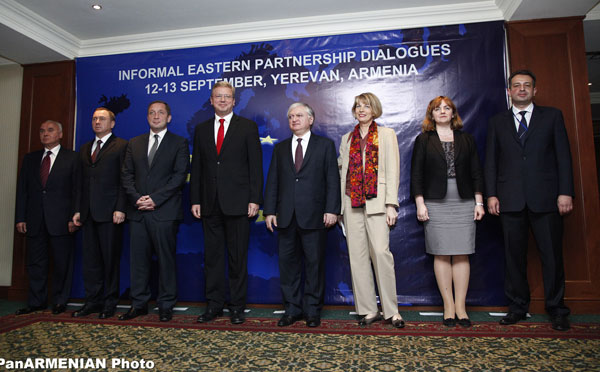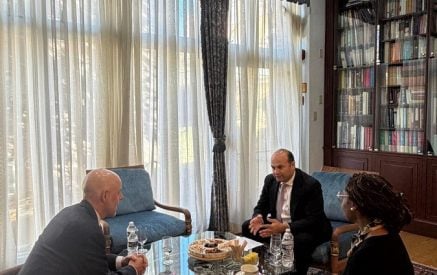“Despite the pressures exerted on us, we will keep the choice unchanged,”- said the Deputy Prime Minister of Moldova in Yerevan
The informal meeting of Foreign Ministers of the Eastern Partnership member countries held in Yerevan last week was the last before the summit to be held on November in Vilnius. On September 13, at the end of the meeting held in Yerevan, which was attended by foreign ministers and senior officials from the Eastern Partnership countries, Armenia, Georgia, Azerbaijan, Belarus, Moldova and Ukraine, at the wrap-up press conference with participation of heads of delegations, assessments were voiced, which seems slipped the attention on the background of future EU-Armenia relationship and the statement of Stefan Füle. Meanwhile, ahead to the summit Vilnius, the statements of the heads of the delegations at the second informal meeting of foreign ministries in Yerevan showed that the path to EU is not either easy for these countries, furthermore, these countries are also subjected to pressure, but they resist realizing the advantages that the citizens of this country are looking to get from the EU Association process.
Meanwhile RA Foreign Minister Edward Nalbandyan was assuring that the Eastern Partnership has become one of the most effective tools for reforms implemented for modernization of the country, and was emphasizing that Armenia is firm to possibly move the close cooperation with EU in a wide variety of directions to the extent that it will oppose the decision of Armenia on joining the Customs Union, the European Commission for Enlargement and European Neighborhood Policy Commissioner Stefan Füle clearly emphasized that the EU will support and stand by their side, who will obey undue pressures.
Afterwards, Füle drew attention to the statement made by the EU Delegation in Armenia regarding the cases of intimidation of human rights defenders and violence against civil activists, and expressed his concerns to this respect.
Read also
Referring to the level of the EU relations with each of the Eastern Partnership countries, Füle noted,- “The biggest expectation is generating from the Association Agreement and DCFTA Agreement. This is an opportunity to sign this Agreement with Ukraine. We expect that many such agreements will be signed with Georgia and Moldova. I hope that there will be a jump forward with respect to visa dialogue. We expect good news between the EU and the Republic of Moldova regarding the Visa Action Plan. If Ukrainian counterparts continue the good work done by them, we can have the sale approvals with the Visa Action Plan between the EU and Ukraine, and thus we will get closer to visa-free travel regime.
As for the relations with Azerbaijan, we are working on so-called strategic partnership for modernization. We are full of hope that we will be able to sign this important document with Azerbaijan.”
Helga Schmidt, Deputy Secretary General for the European External Action Service, stated that she is in Armenia on behalf of Ashton to stress again that they continue to adhere to the advancement of
political association and economic integration with Eastern European partners. “The upcoming Vilnius summit will be one of the most important moments not only for the EU, but also for the member States, as the leaders of all 28 states, heads of governments are invited to participate in the summit. We want to deepen our relationship bilaterally as well as to advance our relationship multilaterally, and we want to overcome, and dispel the main challenges facing us with the six countries, particularly in the areas of foreign and security policy. Today, the EU has six operations of crisis management, and some of them are closer to this region, some of them are far away. We have become a real security provider, and we would like to cooperate more closely with the Eastern Partnership states, and we highly evaluate the partnership with the states,”- said Schmidt.
Vladimir Makey, Deputy Foreign Minister of Belarus, noted that before the Vilnius summit a very interesting discussion was held in Yerevan with regard to the development of prospects of the Eastern Partnership. “I stressed that it is very important that all countries are treated equally and indiscriminately based on the values of the Eastern Partnership. We have earlier presented specific proposals which relate to the question of how to proceed with the development of the Eastern Partnership initiative, and how to manage to get the next summit successful. I think that the Eastern Partnership initiative should not be a political project, it must be pragmatic project, and therefore, it is important to discuss the issue as to what dividends this initiative will bring to ordinary people.”
Georgia’s State Minister for Euro-Atlantic integration structures Alexi Petriashvili said that they have discussed issues related to the preparations for the summit in Vilnius, as well as views were voiced regarding the agenda and strategy of post-Vilnius period.
“We all agreed that we had the EU solidarity towards the freedom of choice, the freedom of sovereign decision-making is very important, and we welcome the statements made a few days earlier by the European Commissioner Füle and other senior officials. We hope and believe that we will be initialing the Association Agreement and DCFTA. We welcomed the statements that it is possible to sign the Association Agreement in the near future, in other words, before the end of the term the European Commission staff. This is very important not only for Georgia but for the Eastern Partnership in the future.”
Mahmud Mammad-Guliyev, Azerbaijani Deputy Foreign Minister, said that we should work together to eliminate the main obstacles that are available in the Eastern Partnership region on the way to the EU integration. “They are the available conflicts in the Eastern Partnership region. We asked for the issue to become one of the main topics of Vilnius summit and be reflected in the Summit Declaration.”
Moldova’s Deputy Prime Minister, Minister of Foreign Affairs and European Integration Natalia Gherman’s speech was very interesting. She stressed that for Moldova, European integration is the most effective model of raising the level of transformation, modernization and prosperity, stability and security of her country. “As a sovereign state, Moldova has made its free choice and despite all the attempts of pressure, we won’t change it. As for the European policy called Eastern Partnership, which we have discussed in an informal meeting of foreign ministers, this policy is a tool for us, which we use with maximum benefit of it to reach our goal. As for the bilateral framework, we are getting ready for the Vilnius summit keeping in mind to initialing the Association Agreement and the DCFTA.”
Deputy Minister for Foreign Affairs of Ukraine Andrii Olefirov said that as the representative of Ukraine, he has confirmed in Yerevan that his country is determined to go deeper into the integration with the EU. “I have introduced also our pretensions to see the signing of the Association Agreement, including DCFTA in Vilnius. In this respect Ukraine is doing everything possible: we modernize the Election Code based on European standards, we transform the judicial system, we improve the business environment, we are getting ready for the adoption of DCFTA. Much has been done in all areas. Our progress in terms of reforms, in my opinion, is obvious. I am very happy to note that the Association Agreement, which we will be signing in the near future, has completed and united the Ukrainian government, the opposition and civil society. With this unity we will achieve success in Vilnius with confidence,” – emphasized Deputy Minister for Foreign Affairs of Ukraine.
Emma GABRIELYAN























































